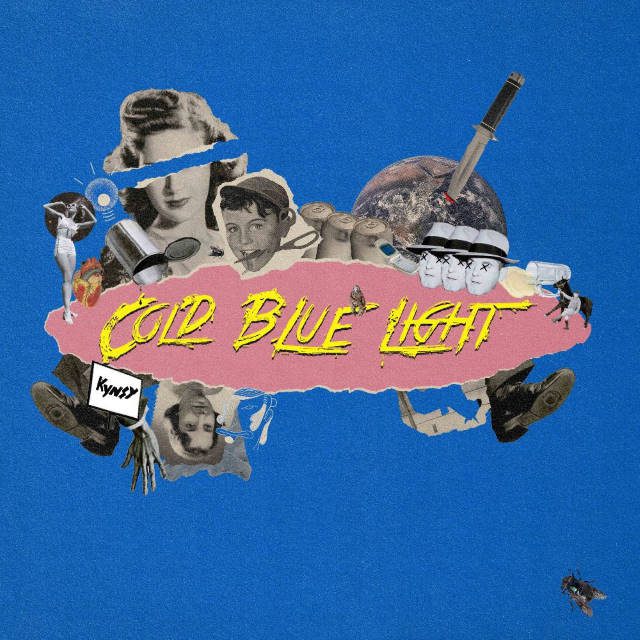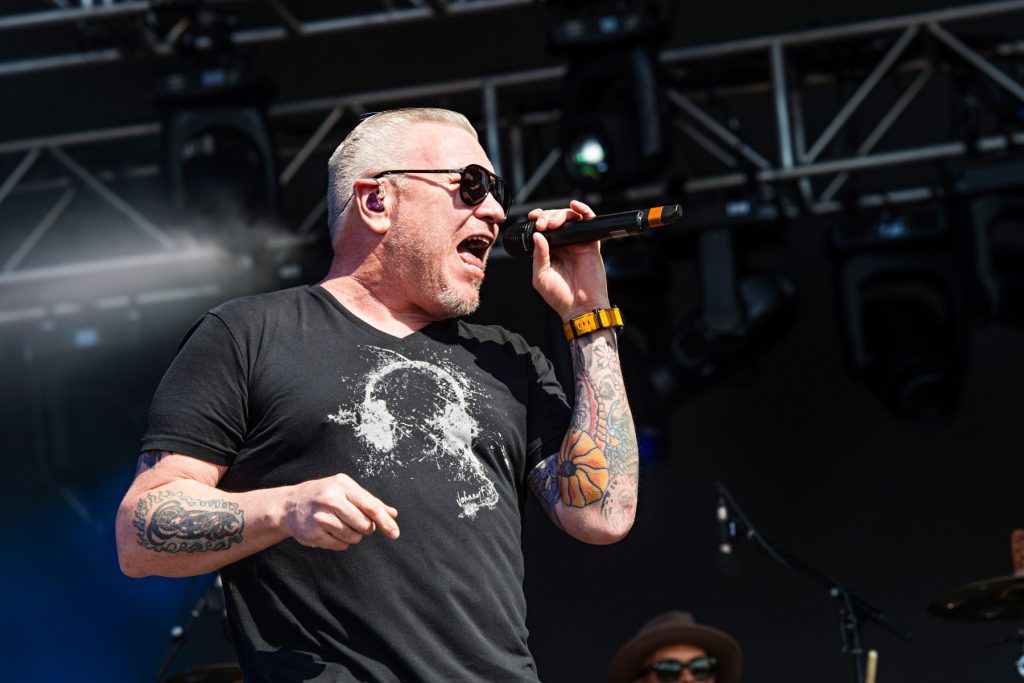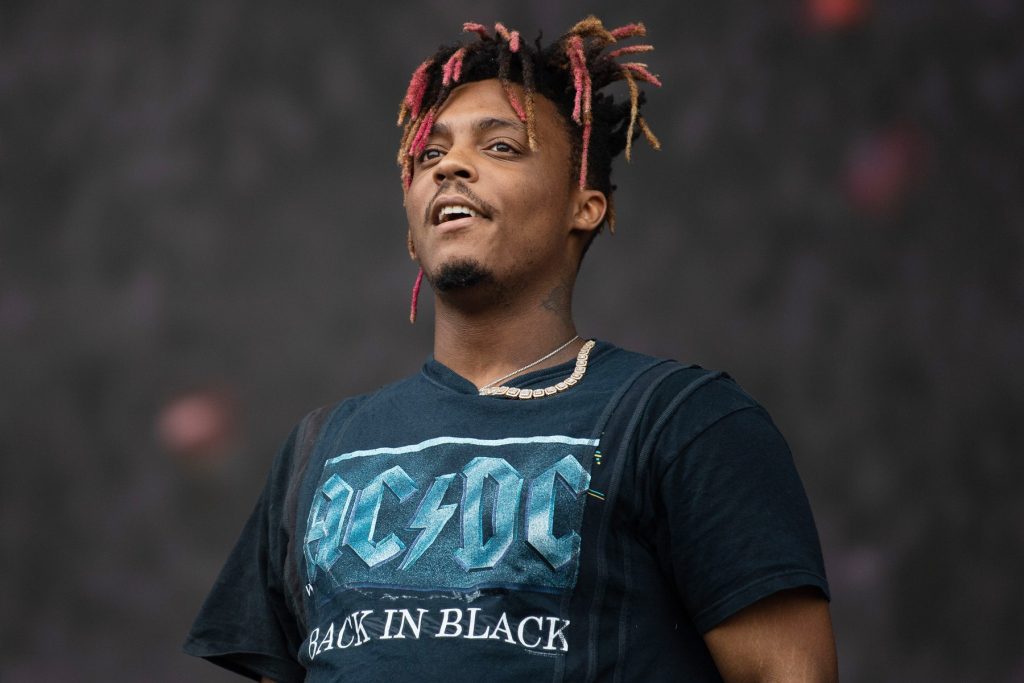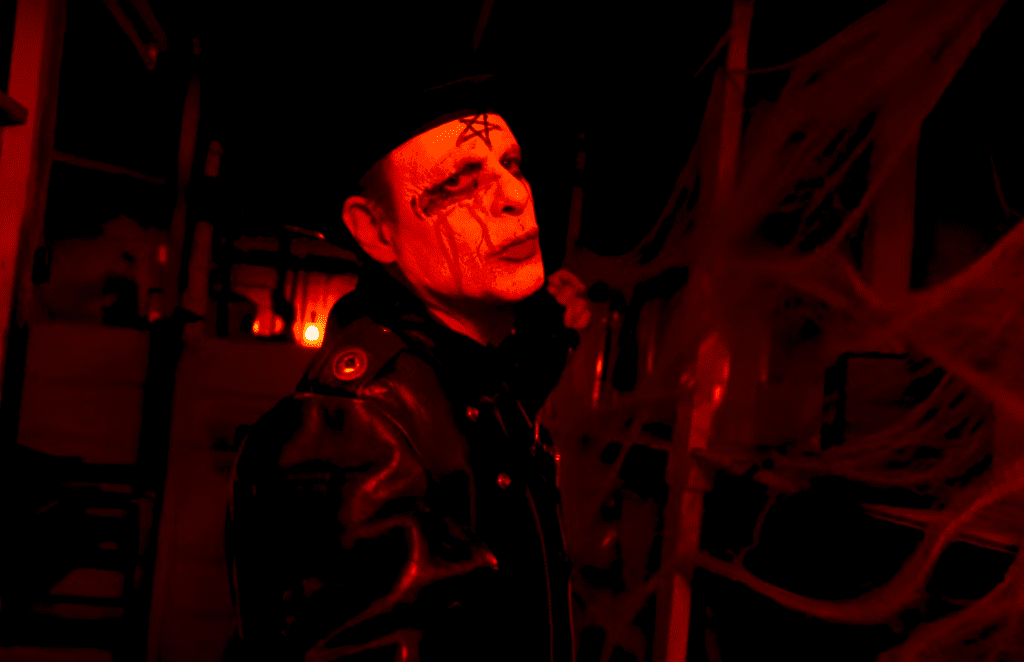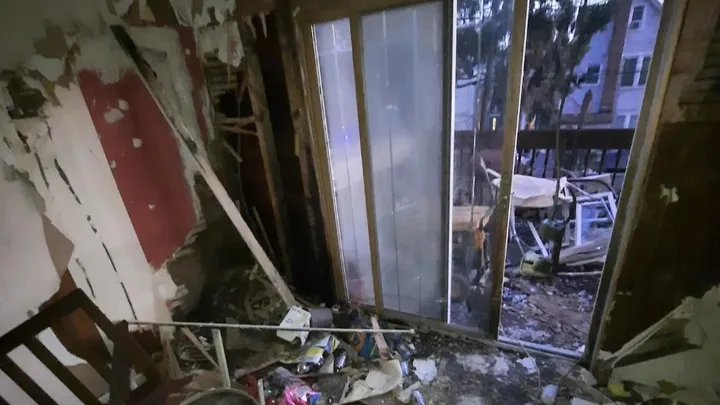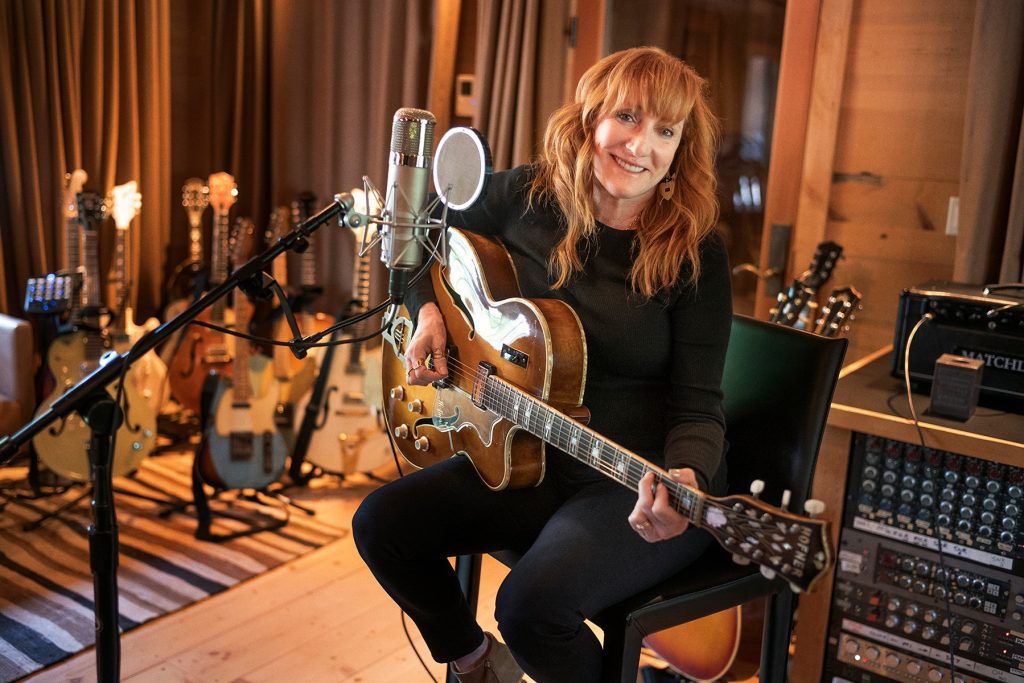
Patti Scialfa on Quarantine Life in New Jersey, Writing Music for Teen Drama ‘Pearl’
In the early Nineties, Bruce Springsteen and Patti Scialfa moved to Los Angeles and found themselves living next door to movie and TV director Bobby Roth, who has worked on everything from Miami Vice and Beverly Hills 90210 to Agents of S.H.I.E.L.D. They formed a tight friendship that resulted in Roth occasionally sprinkling Scialfa and Springsteen songs into his movies, including his 2003 John Ritter–Janeane Garofalo black comedy Manhood, and that bond only deepened when he married Springsteen’s sister, actress and photographer Pamela Springsteen. “He’s part of the family,” says Scialfa.
And so when Roth called up Scialfa and asked her to contribute songs to his new movie Pearl (arriving for on-demand viewing this week), she didn’t hesitate to help out. It’s the story of an affluent teenage girl (played by Larsen Thompson) who is forced to live with a father she never knew (played by Anthony LaPaglia) after her mother is brutally murdered by her deranged stepfather, who then turns the gun on himself right in front of her eyes. “He told me all about it on the phone,” says Scialfa, “and how it was about deep loss and how [the main character] navigates her way through losing her mother.”
Scialfa contributed the new songs “Motherless Child” and “Plastic Horses” to the project, and Roth also wound up using “Charm Light” and “Spanish Dancer” from her 1993 debut LP Rumble Doll. She called up IndieLand to chat about Pearl, her upcoming studio album, life in quarantine with Bruce Springsteen at their New Jersey estate, learning to cut his hair during this time, and her hopes and fears about the future of live music.
Tell me about writing “Motherless Child” for Pearl.
I’ve had this title “Motherless Child” around for some time, but I’d never finished it. I had the basic melody and music and the chorus. As soon as [Bobby] told me about this movie, I thought, “Oh, ‘Motherless Child.’ Let me dig that out of my archives of unfinished work,” which is quite a bit. It was good because it did make me finish it. I thought to myself, “This will be perfect for his film.” We have a studio on our property, so I recorded it there and sent it to him.
Who plays on the song besides you?
Ron Aniello, who produced my Play It as It Lays album [in 2007]. Bruce ended up meeting Ron, and he’s been doing a lot of his records with him. But he met him through my Play It as It Lays record. Anyway, I went in the studio with Ron, and I played him the song on the piano. He did basically everything. We put everything down in a day. I showed him and out it went.
And then Bruce wandered in because the studio is on our property. He always wanders in and out. I had a very short version of the song. Bruce just came in and said, “It needs a solo. It has to be longer.” “I don’t want it to have a solo. I just want it to be really capsulized and really, exactly what it’s saying without anything taking away from the focus of that.” He just goes, “No. It’s too short.” He came in and put the guitar solo on it. Then we flipped back into the chorus.
It sums up the emotional journey of the character quite nicely, which I guess is why Bobby placed it near the end of the film.
Yeah. It’s nice being given direction or a specific narrative. Then you go, “OK, this is loss — deep, deep loss. It’s a tragic circumstance.” That actually makes it easier to write a song to me. Anything that is dark and complicated and dimensional is actually easier than writing a fun and happy song.
How about “Plastic Horses?”
“Plastic Horses” was among the material [I came across] when “Motherless Child” was in its infant stage. It was another thing that was in quarter time and a waltz. He said that he just needed something for the opening of the film, which was great because I didn’t have the lyrics done to that one either. I gave him that and just said, “Is this good for you?” It was very easy. The whole process was very easy. I just played it on piano and just gave it to him.
Tell me about first seeing the movie and how it felt to see your music get woven into the storyline.
I’m always really honored to hear my music in some other form than me putting it out. I love making albums. I write all the time. But I have a pretty big other life with the [E Street] Band and having children, so I don’t really push my own work. I just release it. So when I hear someone else [cover it] or hear it in a TV show, it’s a validation in a way: “Oh, somebody has heard this. I’m not making it in a vacuum.” It’s very pleasing, really nice. It does not grow old for me.
Are you you working on a new album?
Yeah, I am. I am halfway. I think I have half of it mixed at the minute. I’m at that point where I have the rest of the songs, but I have to finish out writing the lyrics. I have the songs, the melody of the songs, and the music, and I’ll usually always have the chorus. And then I have to go back and fill in what I really want to say and just make it more specific, more artistic in a way.
Are you thinking about 2021?
I hope so. Spring, I hope. We’ve been sharing a studio, and Bruce has just been so prolific lately that it’s hard for me to get in there. He’s always like, “I have to go do this thing and that thing.” Getting some traction is the hardest thing for me.
Is Ron producing it?
Oh, yeah. Ron is basically living here. You just walk in the studio and everyone is there. You can make music every day, which we do. Ron is great. Ron and I are producing it. Ron is a really perfect partner for me because he’s very, very musical. He can play any instrument. You have an idea and you go in; you don’t have to call a bunch of musicians to flesh it out. You can do it at home.
He’s also very open, which is a lovely part of his personality. He will dig and find what I’m looking for because I am extremely specific with what I want to hear. I always hear it in my head, but the problem is chasing it down, lassoing it, getting it to be recorded in a way you were hearing it in your head. And he’s really good. We know each other really well now. He has a good sense of what we’re going for, and then he adds beautiful things to it. I always say no at first, and then I say yes because he’s right. [Laughs]
Tell me about your home studio.
When we were building this property, we created this garage because we collect cars. They are not cars they call “neat,” where they are in perfect, original condition. It’s not that. It’s just cars that are old that you can really drive and have fun with, and you don’t have to worry about. We were making this garage for them, and it was right before a tour. I went over the plans with the architect. We were living in town and raising our kids — they were younger — and I never really came to see it until after it was mostly up already. It was too big. I really was embarrassed by the size of the structure, to tell you the truth.
I walked in and said, “No, no, no.” I asked Bruce, “Will you let me make a studio in here?” Bruce was like, “Yeah, go do it.” He gave me full rein over the project, which was wonderful, and we have very similar taste. I worked with [recording engineer] Bob Clearmountain with putting the sound part together. We made this really beautiful structure. It has windows and doors so you can see out on the farm. It’s a place where you can literally work 12 hours and think you just worked three hours. It’s really great.
How has the pandemic changed the way you work there?
We have four isolation booths at either end of the studio. Then after that, we have a lounge and a little kitchenette. So when people come in to work, they have moved into the isolation booths. And Bruce and I will be in the studio. The engineer and Ron stay physically out of the studio, separated by glass and a wall. We rigged the place so they can run the recording equipment from outside of the studio.
How is your pandemic going in a broader sense? You used to travel a lot. What’s it like to basically never leave?
I can’t complain, first of all, because we’re very, very lucky. We have a beautiful space here. We can go outside every day. We have things to do and our studio. I can’t complain about that at all. I feel extremely fortunate.
That said, I think the hard thing about the quarantine is being unable to be physically close to those who are most important to you. We do see some of our friends, but it’s difficult and slightly unnerving to not be able to hug somebody that you deeply care for. It’s almost against human impulse. You have to be careful. We see most of our friends outside on the porch. We have a large porch, and we put fans up and stay almost 10 feet apart from each other. But after a few drinks, you start inching closer. “Oh, no, we’re not supposed to be that close!”
It’s difficult. My mom, she’s 92, and I can’t see her. She’ll come over on the porch and stay far away, but I can’t touch her. I think that’s such a basic human need. It’s just something that you’re compelled to do unless you’re a psychopath. It’s just sad. That’s the sad part of it. I don’t see my oldest son, Evan, who works for Apple. He makes playlists for Apple. He doesn’t come down much at all.
I’m a bit high-risk because of something I have in my health. My children are very cautious. My youngest son, Sam, won’t come in the house. He’s a firefighter. He’ll just stay out on the porch and ask for food. We hang out and talk. Evan doesn’t come in the house either. My daughter is in Europe right now. But she had a test and waited until she was clear, and then she was in the house with us for a week, which was really nice. I can’t complain, but it’s difficult. You miss those relationships, your physical relationships with your friends.
View this post on Instagram—gave my man his first quarantine cut— Hey Chris McMillan working on being a badass with the scissors…. thanks for sending the instructions and the clippers!!! Also I had just finished dying my hair!! We have the beauty truck in action at Stone Hill Farm!!!!! ✂️✂️✂️✂️
I saw the photo of you giving Bruce a haircut. How did that go?
Oh, my God! You know what? I hate to say this, but you know how you’re just living your life and you’re not thinking? I’m giving him a haircut. He doesn’t have a shirt on. I look like I’m a crazy woman. And we’re just laughing and we go, “Let’s make a funny picture, and I’ll post it.” Of course, he doesn’t post it on his stuff. Then you just see it everywhere you and think, “Oh, no! What did I do? What was I thinking?” But I liked giving him a haircut. I am the master of the scissors in residence. I give him a haircut every month and a half.
Do you miss being onstage? I see photos of you onstage on the last tour, and you’re in front of 80,000 people packed into a stadium. Those look like images from another universe now.
When you have children, there’s that kind of delineation between “before I had children” and “after I had children.” That’s how this virus is beginning to feel to me. To talk in a broader sense, you’re wondering if everyone is going to get their job back. These are the obvious things you are thinking about, people’s health care, how people are finding their way through this, which most people aren’t.
But personally, what we do in our living, I think there will be a mark for a long time of “before” and “after.” I think that touring musically and the types of shows that we do — I don’t understand how that’s going to come back. You obviously want a vaccine, but when will truly a vaccine be available for real, not from what our administration is telling us? I think there will be more therapeutics before there’s a vaccine, and that will be helpful, but it still won’t let people gather.
Before there’s a vaccine, it would be great if they had something like an immediate test, like a pregnancy test where you can find out immediately and then you can know whether you can be close to people. I don’t know what’s going to happen. Big tours with big gatherings, I think those will be one of the last things that will be reintroduced to civilization, to the way we live.
A big part of your life is being onstage at the biggest possible mass gatherings.
[Big laugh.] It’s true. You know, in your mind you have a lot of different lives. When you put some distance between your music life when you’re working, you look back on that. My friends send me pictures of when they came to a concert in Barcelona or something, and they go, “My God, will we ever be able to do this again?” You just don’t know. It looks so far away at this point. That’s a little frightening that it looks so far away. I just don’t know. The good thing is we’re working a lot, and we’re able to make music here. Bruce is just really busy, so that’s good, but I don’t know. What do you think?
My best guess is that 2022 will be the soonest that big gatherings like the kind you two specialize in will be feasible again, but I just have no idea.
Look, how many people need to be inoculated? The world! How long will that take? Then how do we know how effective it is? Maybe it doesn’t have that much efficacy and only lasts six months. We just don’t know. The Atlantic wrote this piece that Bruce and I were both reading when we woke up. It’s well-written, but it’s frightening. I had to stop reading it. I said, “I’m not starting my day reading this” because it was dour.
I’m worried that something like a third of the country will be skeptical of the vaccine and they’ll refuse to take it. Then what happens?
I do feel that way too. I think if we have different leadership, maybe it will diffuse some of that harsh polarization that people are feeling right now. It’ll calm it down a bit. And with good health people talking to us that really know what they’re talking about, like Dr. Fauci will be introduced into our sphere, we can take guidance and comfort from these people. Hopefully, that will dismantle some of the anger and the rage and the polarization that has been going on in our country.
I’ll wrap in a second here, but do you think that after your album comes out and touring is feasible, you’ll want to launch another solo tour?
Oh, God, I so want to do that. I was all ready. Danny Clinch holds this festival in the summer, Sea. Hear. Now. It’s in Asbury Park. He asked me to play, and it was going to be big, something like 10 or 20,000 people on the beach. I was going to come out and play a 45-minute set. I went, “What a great way to get going!” It was booked, and I was on the list. Then it was just done. But I’d love to go out with my music. I really would.
I saw you back in 2004 at the Bowery Ballroom. That was a fun night.
That was fun. When you actually give yourself that and make the time for it … I just had a blast with that. It was so much fun. I actually had more of a tour planned for 23rd Street Lullaby, but then Bruce started his tour early and I had to stop. I told him that recently, and he was like, “Oh, my God, I did that?” [Laughs]
I’m very hopeful that you’ll be back onstage in a year or two and all this will be a bad memory.
That’s really nice to hear. I’m hopeful too. I’m basically a hopeful person, and I’m hopeful about that. I am.
